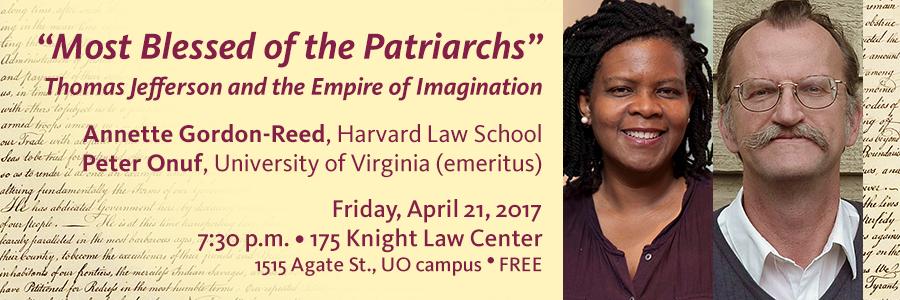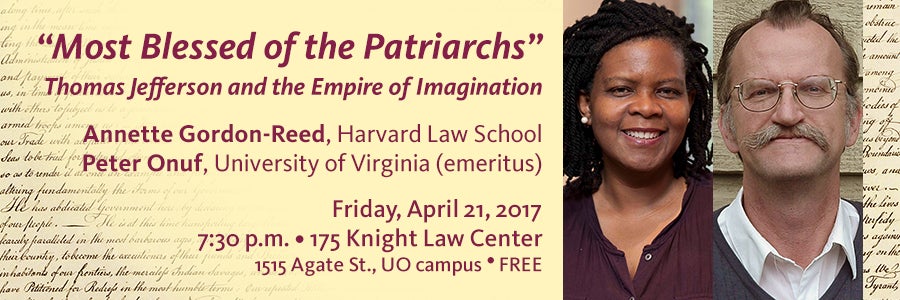
“Most Blessed of the Patriarchs”: Thomas Jefferson and the Empire of the Imagination
The Oregon Humanities Center is honored to host two of America’s leading Jefferson scholars for this spring’s O’Fallon Lecture in Law and American Culture: Annette Gordon-Reed, Charles Warren Professor of American Legal History at Harvard Law School; and Peter Onuf, Thomas Jefferson Professor Emeritus, Early American History, University of Virginia, and Senior Research Fellow at the Robert H. Smith International Center for Jefferson Studies (Monticello). Gordon-Reed and Onuf will present a lecture-conversation based on their recently co-authored biography of Thomas Jefferson, “Most Blessed of the Patriarchs”: Thomas Jefferson and the Empire of the Imagination. The lecture will take place on Friday, April 21st at 7:30 p.m. in 175 Knight Law Center, 1515 Agate St. Jefferson is often seen as being an enigmatic figure, riddled with contradictions. While lauded for his many achievements and contributions in the public and political spheres, some aspects of his life are more problematic and controversial. He was, without question, a complex person, who possessed a formidable intellect as well as a vibrant imagination. Primary author of the Declaration of Independence and founder of the University of Virginia, Jefferson was a polymath who mastered such diverse disciplines as mathematics, surveying, horticulture, mechanics, architecture, linguistics, religion, and philosophy. He spoke several languages and was a prolific letter-writer and correspondent. An outspoken proponent of freedom and equality who, during his brief practice as a lawyer, at times defended slaves seeking their freedom, he was also the owner of several plantations, worked by hundreds of slaves. (His intimate relationship with one of his slaves, Sally Hemings, is carefully documented in Gordon-Reed’s Pulitzer Prize-winning book, The Hemingses of Monticello: An American Family.)
Jefferson is often seen as being an enigmatic figure, riddled with contradictions. While lauded for his many achievements and contributions in the public and political spheres, some aspects of his life are more problematic and controversial. He was, without question, a complex person, who possessed a formidable intellect as well as a vibrant imagination. Primary author of the Declaration of Independence and founder of the University of Virginia, Jefferson was a polymath who mastered such diverse disciplines as mathematics, surveying, horticulture, mechanics, architecture, linguistics, religion, and philosophy. He spoke several languages and was a prolific letter-writer and correspondent. An outspoken proponent of freedom and equality who, during his brief practice as a lawyer, at times defended slaves seeking their freedom, he was also the owner of several plantations, worked by hundreds of slaves. (His intimate relationship with one of his slaves, Sally Hemings, is carefully documented in Gordon-Reed’s Pulitzer Prize-winning book, The Hemingses of Monticello: An American Family.)
Gordon-Reed and Onuf maintain that in order to understand Jefferson’s career as a statesman, one must understand his private life. The authors suggest that Jefferson’s sense of himself and his vision of America’s republican future were shaped by his personal relationships—with enslaved people, family members, and friends and visitors to his plantation home in Monticello and to his other homes in Europe and America.
The O'Fallon Lecture was established by a gift from Henry and Betsy Mayer, named in memory of their nephew, son of UO Law professor James O'Fallon and his wife, artist Ellen Thomas. The subject of this lecture alternates between law and art and American culture. Past topics have included philosophy, jurisprudence, American political life, architecture, and art theory and criticism. The lecture is free and open to the public, and will be followed by a book sale and signing. For more information, or for disability accommodations (which must be made by April 14), please call (541) 346-3934 or ohc@uoregon.edu

